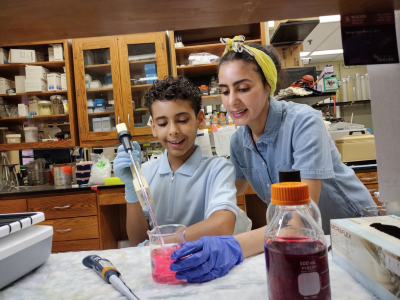
Outdated ideas about masculinity can mean some male academics are hesitant to participate in conversations about advancing gender equity in science.Credit: Vasyl Dolmatov/Getty
Carers working in academia — the vast majority of whom are women — face disproportionate career burdens, and the cultural shift needed to correct that imbalance will require considerable action from men. To advance that cause, the international non-profit organization Mothers in Science (MIS) is launching a global awareness campaign to amplify the voices of fathers who are redefining fatherhood and advancing gender equity.
Called Fathers Who Care, the campaign kicked off on 16 June to follow Father’s Day in many countries, as well as Men’s Mental Health Awareness Day, part of Men‘s Health Week. In addition to releasing a resource guide and rolling out new data and testimonials from men in academia, MIS hosted a webinar on 19 June, led by a panel of fathers who shared their journeys and strategies for building more equitable partnerships. Fifteen organizations have endorsed the campaign so far, including the UK advocacy group Pregnant Then Screwed and DadsRock, a charity based in Edinburgh, UK, that offers workshops, group meetings and one-to-one support for fathers.
US National Academies report outlines barriers and solutions for scientist carers
Isabel Torres co-founded MIS, which is based in France, in 2019, and says that the organization has struggled to recruit men and engage them in the difficult conversations needed to bring about structural change. The reasons for their hesitation aren’t always clear, but Torres acknowledges that men also experience stigma rooted in outdated ideas of masculinity, and a lack of mental-health support that can dampen their participation. “We’re at a place now where we can try to dig into that by speaking to the men we do have in our networks,” she says.
Early takeaway messages from those discussions suggest that many men remain unaware of the ‘maternal wall’ in academia that penalizes women for having children. A 2019 study found that becoming a parent prompted more than 40% of new mothers (and about one-quarter of new fathers) to leave full-time employment in science, technology, engineering and mathematics (STEM) fields, and about 15% of new mothers to leave the workforce entirely1. Among those who do understand these career disparities, there are often feelings of shame or a sense that, because of their roles in perpetuating inequality, men’s voices would not be welcome.
“I do see that a lot of men want to be more involved, but there is a fear of interfering because they feel this is a women’s space,” Torres says.
Rebalancing the norm
This lack of participation was particularly striking to Andrew Weightman, a medical mechatronics researcher at the University of Manchester, UK, who was a moderator of the 19 June panel. Earlier this year, Weightman attended a presentation by MIS and was shaken both by how few men he saw there and by his self-reflection on his role as a parent. Weightman’s wife is a teacher, and together they have a seven-year-old son. Although his institution offered shared parental leave, Weightman says it was ultimately his wife who stayed at home and who continues to work part-time today.
“Reflecting on the past, I don’t think the balance has been right, and the social norm has been for me to work and my wife to take time off. That’s a problem, and I don’t know how to address it,” he says, adding that his participation in MIS is one attempt to do so. “I need to be vocal and open about my mistakes and to have conversations on how we can get to a more equal society.”



